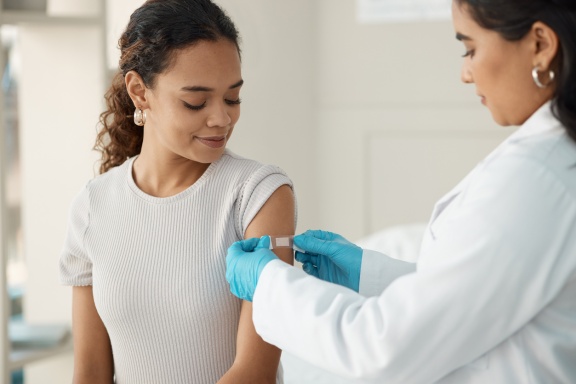Autumn is synonymous with back to school, football season, falling leaves—and vaccine season. Vanderbilt Health infectious disease experts William Schaffner, MD, professor of preventive medicine, health policy, and H. Keipp Talbot, MD, MPH, professor of medicine, share why adult vaccines make a difference and what you need to know before going into cold and flu season.
“What most misunderstood about adult vaccines is that if you can still catch the disease, why bother getting vaccinated? When we vaccinate children with a measles vaccine, for example, they never get measles, but that concept doesn't really apply to adults,” explains Dr. Talbot. “But when we vaccinate adults, our goal is to keep you healthy and out of the hospital and mitigate any side effects” of the flu or other infectious diseases,” she said. “It's also to protect our loved ones,” especially those who are immunocompromised.
Here are three vaccines to get this fall to protect you and your family members and loved ones.
1. Flu. Flu season in the United States generally begins in October. “The flu vaccine is developed each year based on the flu viruses that are circulating at the end of the last year’s flu season,” Dr. Schaffner. “That’s why everyone 6 months and older should have a flu vaccine each year before the start of flu season.” The flu vaccine is especially important for adults ages 65 and older, children under 5 and people with weak immune systems.
For those younger than 65, the CDC does not recommend any one flu vaccine more than another. However, those 65 and older should get a higher-dose flu shot, such as a quadrivalent vaccine, for better protection.
2. COVID-19. Another wave of COVID-19 infections has started across the middle Tennessee region. To reduce the risk of becoming ill, get tested if you have symptoms and consider masking in high-risk situations. As for the next COVID-19 vaccine, a new updated version is anticipated within the next 6-8 weeks from Pfizer, Moderna and Novavax. The vaccines will target XBB.1.5, the Omicron variant that currently accounts for about 12% of cases.
“Vaccines are like a seatbelt in the car,” Camille Kotton, MD, a physician at Massachusetts General Hospital and a member of the CDC Advisory Committee on Immunization Practices, has said about the COVID vaccine. “Though it may not be 100% protection, you are much more likely to be saved in a bad accident. Even partial protection is better than none.”
3. RSV. This month the Centers for Disease Control and Prevention (CDC) recommended a new shot against respiratory syncytial virus, or RSV, to protect infants less than 8 months old and infants 8 months to 19 months if they are at risk for severe illness. Also new this year are the first shots to protect older adults and those with health problems from RSV.
“Most people know is RSV is a virus that can cause severe disease in children,” Talbot says, but it can also cause respiratory illness and lead to hospitalization for older adults and those who have cardiovascular disease, chronic lung disease or diabetes. “The virus circulates about a month before influenza and … it causes wheezing, croup and bronchiolitis.”
To learn more about important vaccines to get this year, check out the CDC’s Vaccines & Immunization page.
And check out these links for more about the new RSV vaccine, and facts about RSV in infants and young children.
